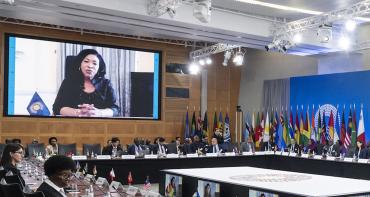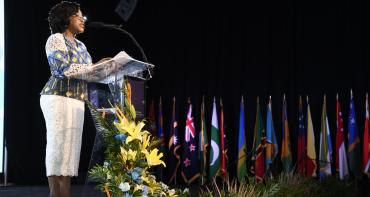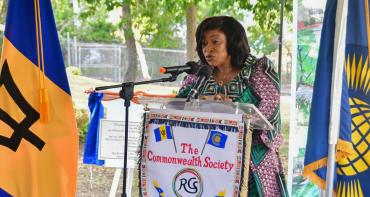India is leading the way with commitment and innovation that is smart and transformative, according to Commonwealth Secretary-General Patricia Scotland.

India is leading the way with commitment and innovation that is smart and transformative, according to Commonwealth Secretary-General Patricia Scotland.
She was speaking at an event hosted by Observer Research Foundation in Delhi on her first official visit to India as Secretary-General.
“A smarter future is more than simply a technologically advanced future,” said Secretary-General Scotland. “Our Commonwealth understanding and approach sees respect for the dignity of all individuals and communities as being vital to sustainable progress. We see social inclusion and economic inclusion as being inextricably interlinked. Each is vital in building resilience and reducing vulnerability.”
The theme of the special address, in front of about 200 people, including Commonwealth high commissioners and senior officials from India’s Ministry of External Affairs, was ‘The Commonwealth: Working together for a Smarter and More Resilient, and Gender Balanced Future’.
“By providing for the aspirations and needs of citizens, it aims to develop the entire urban eco-system, which is represented by the four pillars of comprehensive development: institutional, physical, social and economic infrastructure,” the Secretary-General continued.
“Such smart approaches to social inclusion encompass intergenerational justice, with due attention paid to the needs, aspirations and dignity of all demographics, particularly youth, through education and meaningful employment opportunities.
“Solutions are only smart if they are sustainable. That is why our Commonwealth focus is on building resilience and reducing vulnerability.”
Secretary-General Scotland said the theme of next April’s Commonwealth Heads of Government Meeting in London would be ‘Towards a Common Future'.
She said, “There will be special focus will on how that common future can be made more sustainable, fairer, more secure, and more prosperous for all. One such challenge, facing us now with increasing urgency, is the threat of climate change.
“It affects us all and threatens our collective future and wellbeing. Many of our smaller and our more vulnerable member countries have recently been disrupted, and in some cases devastated, by extreme weather events and other catastrophes. The adverse impact of climate change is affecting every region of the Commonwealth.”
The Secretary-General gave a powerful example of the existential threat of climate change when she spoke about her recent trip to the Caribbean islands destroyed by a series of Category 5 hurricanes. She highlighted devastating floods and landslides in India, Pakistan and Bangladesh as well as natural disaster in the Pacific as outlining urgent need to build resilience.
“Resilience is a strength we seek to build in the Commonwealth, as a defence against the vulnerabilities resulting from geographic, economic, social, political or human factors,” she said. “Resilience can be built using the regenerative model of development.
“We have spent the last eighteen months carefully working in consultation with our member states, and with a broad array of scientists from many disciplines, and other specialists.
“Our determination has been to find holistic solutions, and to work together towards a common future based on the Commonwealth Charter and 2030 Agenda for Sustainable Development which, by definition, leave no one behind.
“As our understanding has evolved, the regenerative model for building resilience to climate change has emerged, including specific expressions of collective commitment such as the Commonwealth Blue Charter.”
The ease with which member states work together, she said, was part of the “Commonwealth advantage”. Not only does this advantage apply to trade but to human rights, rule of law and ability to seek justice because of the common ties which bind the Commonwealth family of 52-member countries.
The Secretary-General said, “To help our member countries derive even greater benefits from the distinctive ease with which we work together in the Commonwealth, we are establishing an Innovation Hub at the Commonwealth Secretariat.
“As a repository of knowledge and expertise on successful innovation, it will collate and disseminate examples of what has worked so that they can be applied elsewhere in the Commonwealth. This sits alongside the newly created Commonwealth Office of Civil and Criminal Justice Reform (OCCJR), which draws together templates for legislation, and best practice across a broad range of disciplines and fields of activity.”
These also encompassed gender balance and gender equality. There was a strong correlation between enabling women to become economically enterprising and empowering them, said Secretary-General Scotland.
“Therefore, through Commonwealth programmes and technical assistance, we are working to increase the participation of women in corporate decision-making at all levels.
“We know from ‘The Power of Parity’ report of the McKinsey Institute that between $12 and $28 trillion could be added to the global economy if women played an equal role.
“That 50/50 balance is important. Parity leads to greatest progress. Our goal through the empowerment of people and institutions in the Commonwealth is to achieve 50/50 by 2030.”
That progress, she said, would be severely retarded unless ending violence against women is made a priority. Cold hard figures would drive home its impact.
“Research indicates that the cost of violence against women could amount to around two per cent of the global gross domestic product,” the Secretary-General said. “That is equivalent to US$1.5 trillion, roughly the size of the economy of Canada. Furthermore, findings reveal that domestic and intimate partner violence causes more deaths and entails much higher economic costs globally than homicide or civil war.”
She said significant steps had been made to end violence against women in some member states. But there was still have a long way to go before the scourge of violence against women and girls within the Commonwealth became a reality.



